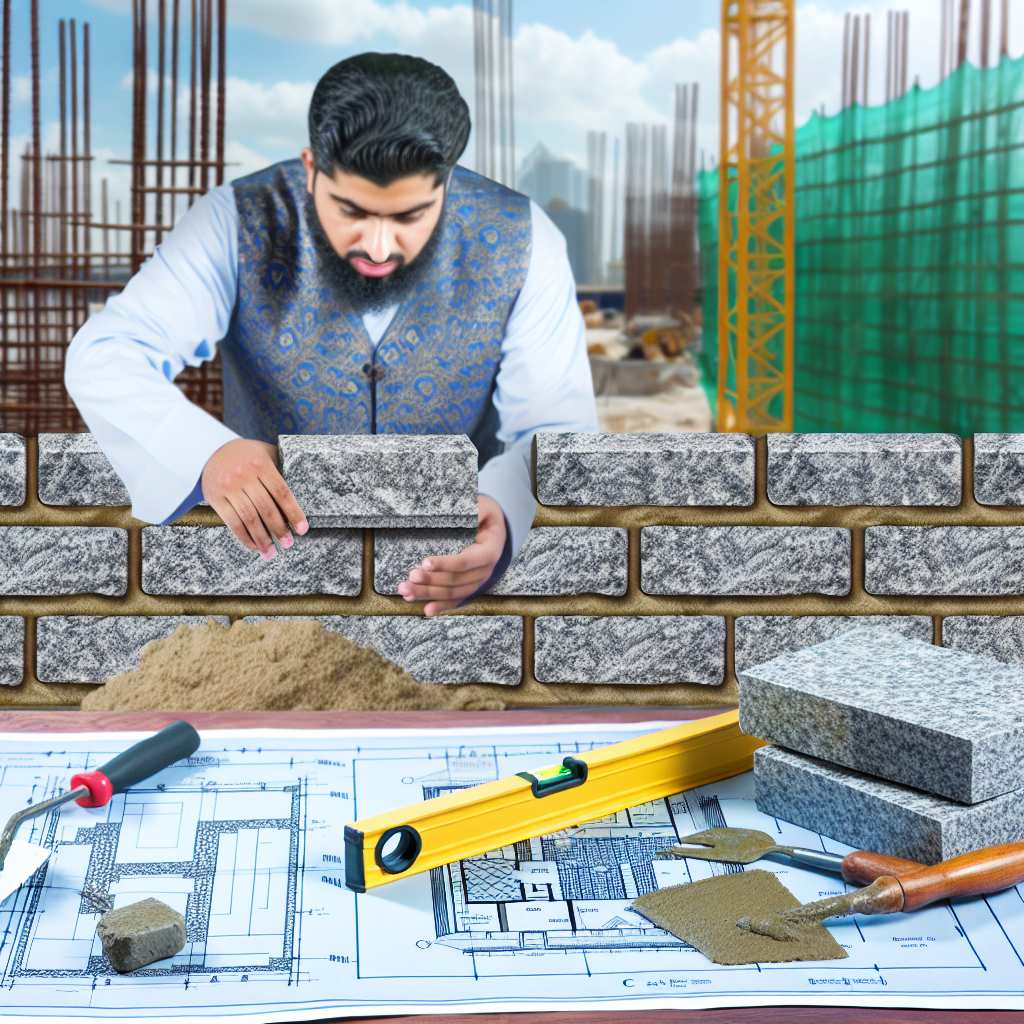Introduction:
Building codes and regulations are crucial in ensuring the safety and structural integrity of buildings.
Masons play a key role in adhering to and enforcing these codes to guarantee high-quality construction.
Understanding Building Codes:
Building codes are set of standards that regulate the design, construction, and maintenance of buildings.
These codes are established to protect the public from potential hazards and ensure that structures are built to withstand various conditions.
Importance of Adhering to Codes:
Adhering to building codes is essential for masons as it helps prevent accidents, structural failures, and legal liabilities.
By following these regulations, masons can ensure that their work meets the required standards and is safe for occupants.
Enforcing Regulations:
Masons are responsible for not only following building codes but also for enforcing them on the construction site.
It is crucial for masons to be familiar with the specific codes relevant to their work and ensure that all aspects of construction meet the necessary requirements.
Quality Assurance:
By understanding and following building codes, masons can guarantee the quality and longevity of their work.
Adhering to regulations also enhances the reputation of masons and ensures that they are recognized as professionals in the construction industry.
Understanding the basics of building codes:
Building codes are regulations that set forth the standards for the construction of buildings and structures.
These codes exist to ensure the safety, health, and welfare of the public.
They specify the minimum requirements for construction, including materials, design, and construction methods.
- Define what building codes are and why they exist: Building codes are a set of regulations that govern the design, construction, and occupancy of buildings.
- Discuss how building codes differ from one location to another: Building codes can vary significantly from one location to another due to differences in climate, geography, and local building practices.
- Emphasize the importance of staying up-to-date with the latest codes and regulations: Building codes are constantly evolving to address new technologies, materials, and construction methods.
It’s crucial for masons to stay informed about changes to codes and regulations to ensure compliance and to build safe and durable structures.
By understanding the basics of building codes and regulations, masons can ensure that their work meets the necessary standards for safety, quality, and durability.
Key Building Code Requirements for Masons:
Masons must follow specific codes and regulations during construction.
Examples include foundation design, wall construction, and fire safety measures.
Not adhering to these codes can have serious implications.
Foundation Design:
- Ensure proper depth and width of the foundation.
- Use appropriate materials for the type of soil and load-bearing requirements.
- Follow guidelines for reinforcement and waterproofing to prevent future issues.
Wall Construction:
- Use approved materials for structural integrity and insulation.
- Adhere to spacing and anchoring requirements for stability.
- Include proper ventilation and drainage measures to prevent moisture buildup.
Fire Safety Measures:
- Install fire-resistant materials for walls and ceilings in specific areas.
- Ensure proper spacing between combustible materials to reduce fire risk.
- Follow guidelines for exits, emergency lighting, and fire alarm systems.
Masons play a crucial role in ensuring that buildings meet safety and structural standards.
It is essential for them to be knowledgeable about building codes and regulations to prevent accidents, protect occupants, and avoid legal consequences.
Transform Your Career Today
Unlock a personalized career strategy that drives real results. Get tailored advice and a roadmap designed just for you.
Start NowBy following these key requirements, masons can contribute to the overall safety and quality of construction projects.
Uncover the Details: Strategies for Effective Project Management
Safety regulations for masons:
When it comes to working in the construction industry, safety regulations are of utmost importance.
Masons, in particular, face various risks and hazards on the job site that can lead to serious injuries or even fatalities if proper safety measures are not followed.
Importance of safety regulations in the construction industry:
- Protecting the well-being of workers.
- Preventing accidents and injuries.
- Complying with legal requirements.
- Maintaining a positive reputation for the company.
One of the key entities that set and enforce safety regulations in the United States is the Occupational Safety and Health Administration (OSHA).
OSHA has specific requirements that masons must adhere to in order to ensure their safety on the job site.
OSHA requirements for masons:
- Personal Protective Equipment (PPE): Masons must wear appropriate PPE such as hard hats, safety goggles, gloves, and steel-toed boots.
- Fall Protection: Masons working at heights above 6 feet must be protected by guardrails, safety nets, or personal fall arrest systems.
- Training: Masons should receive proper training on handling equipment, working at heights, and recognizing potential hazards.
- Hazard Communication: Employers must provide masons with information about hazardous materials used on the job site.
It is essential for masons to prioritize their safety while on the job site.
Here are some tips to help masons ensure their safety:
Tips for masons to ensure their safety on the job site:
- Inspect tools and equipment before use to ensure they are in good working condition.
- Follow proper lifting techniques to prevent strain or injury.
- Stay aware of your surroundings and potential hazards on the job site.
- Communicate effectively with coworkers and supervisors about safety concerns.
- Take regular breaks to prevent fatigue and maintain focus.
- Report any unsafe conditions or practices to the appropriate person immediately.
By following safety regulations and guidelines, masons can minimize the risk of accidents and injuries while on the job site.
It is crucial for both employers and workers to prioritize safety and create a culture of safety in the construction industry.
Discover More: Boilermaker Project Management Tips and Techniques
Environmental regulations for masons:
When it comes to construction, masons play a crucial role in building structures.
These structures not only stand the test of time but are also environmentally friendly.
Waste Management:
- Properly sorting and disposing of construction waste
- Recycling materials whenever possible
- Minimizing waste by accurately estimating materials needed
Pollution Control:
- Using eco-friendly building materials
- Limiting the use of harmful chemicals and volatile organic compounds
- Implementing erosion control measures to prevent soil pollution
Energy Efficiency:
- Installing energy-efficient windows and doors
- Optimizing insulation to reduce heating and cooling costs
- Utilizing renewable energy sources such as solar panels
By following these environmental regulations, masons can contribute to building a more sustainable future.
It’s essential for masons to stay updated on the latest advancements in eco-friendly construction practices.
Find Out More: How to Improve Productivity as a Warehouse Worker

Masons and Code Compliance
Masons play a crucial role in ensuring that buildings are constructed according to code requirements.
Here are some key steps masons must take to ensure their work meets code requirements:
Follow Building Plans
Masons should carefully review and follow the building plans provided to them.
Transform Your Career Today
Unlock a personalized career strategy that drives real results. Get tailored advice and a roadmap designed just for you.
Start NowThe plans outline the specifications and requirements that must be adhered to during construction.
Use Approved Materials
It is important for masons to use only approved materials that meet code standards.
Using substandard materials can lead to compliance issues during inspections.
Proper Installation Techniques
Masons must use proper installation techniques as specified in the building codes.
Failure to follow these techniques can result in structural defects that do not meet code requirements.
Building inspectors play a critical role in enforcing regulations and ensuring that construction projects comply with building codes.
Here is how building inspectors contribute to the process:
Conducting Inspections
Building inspectors visit construction sites to inspect the work being done.
They check for compliance with building codes and regulations at different stages of construction.
Identifying Non-Compliance
If building inspectors identify any non-compliance issues during inspections, they will document them.
Inspectors notify the responsible parties to address and rectify the issues.
Issuing Violation Notices
In cases where serious violations of building codes are found, inspectors have the authority to issue violation notices.
These notices require immediate action to resolve the non-compliance issues.
Preparation is key for masons to ensure successful inspections and address compliance issues effectively.
Here are some tips for masons to prepare for inspections and handle compliance matters:
Schedule Regular Inspections
Masons should schedule regular inspections throughout the construction process.
This helps identify any compliance issues early on and address them promptly.
Keep Documentation in Order
Masons should maintain accurate records of materials used, installation techniques, and any changes made during construction.
This demonstrates compliance with building codes.
Addressing Compliance Issues
When compliance issues are identified during inspections, masons should work closely with building inspectors.
Transform Your Career Today
Unlock a personalized career strategy that drives real results. Get tailored advice and a roadmap designed just for you.
Start NowUnderstanding the requirements allows them to take necessary actions to rectify the issues.
By following these steps and tips, masons can ensure that their work meets code requirements.
They will comply with regulations and successfully navigate the inspection process.
See Related Content: How to Handle Emergency Repairs as a Maintenance Worker
Continuing education and training opportunities:
– Emphasize the importance of ongoing education for masons to stay current with codes and regulations.
– Discuss certification programs and training courses available to masons.
– Provide resources for masons to access relevant training materials and information.
Continuing education is essential for masons to keep up with the ever-evolving building codes and regulations.
By staying current with the latest standards, masons can ensure that they are following the most up-to-date guidelines and producing quality work.
Masons should take advantage of certification programs offered in their area.
These programs often cover important topics related to building codes and regulations, equipping masons with the knowledge they need to comply with standards.
Training courses are another valuable resource for masons looking to enhance their understanding of building codes.
These courses provide in-depth instruction on various aspects of construction, including compliance with codes and regulations.
Accessing relevant training materials is crucial for masons seeking to expand their knowledge.
Online resources, such as webinars and instructional videos, can provide valuable insights into the nuances of building codes and regulations.
Additionally, masons should consider joining professional organizations that offer educational opportunities.
These organizations often host seminars and workshops focused on building codes and regulations, allowing masons to deepen their understanding of these critical topics.
Furthermore, staying informed about changes to building codes and regulations is essential for masons.
Regularly checking for updates and revisions ensures that masons are aware of any new requirements that may impact their work.
Continuing education and training are fundamental for masons to excel in their field and adhere to building codes and regulations.
Transform Your Career Today
Unlock a personalized career strategy that drives real results. Get tailored advice and a roadmap designed just for you.
Start NowBy proactively seeking opportunities to expand their knowledge, masons can ensure that they are well-equipped to meet industry standards and deliver high-quality work.
Building Codes and Regulations
Building codes and regulations are essential for every mason to adhere to in their construction projects.
These guidelines ensure the safety, durability, and quality of buildings.
Importance of Building Codes: Building codes protect the well-being of occupants, provide structural stability, and prevent accidents or failures.
Key Regulations Masons Should Know: Masons must follow specifications for materials, foundations, walls, fire safety, and accessibility for all individuals.
Permit Requirements: Masons should obtain necessary permits before beginning any building project to ensure code compliance and avoid legal issues.
Proper Techniques: Masons need to use approved methods for laying bricks or stones, mixing mortar, and reinforcing structures to meet code standards.
Inspections: Building inspectors will evaluate masonry work to confirm compliance with codes, so masons must be prepared for thorough examinations.
Continuous Learning: Masons should stay current with code updates and industry advancements to deliver safe and reliable structures to clients.
Building codes and regulations are crucial for masons to uphold safety, quality, and industry standards in their work.
It is imperative for masons to prioritize compliance with regulations to ensure the well-being of occupants and the longevity of structures.
Additional Resources
Residential contractor licensing | Minnesota Department of Labor …




